
English_books / New Cambridge Advanced
.pdf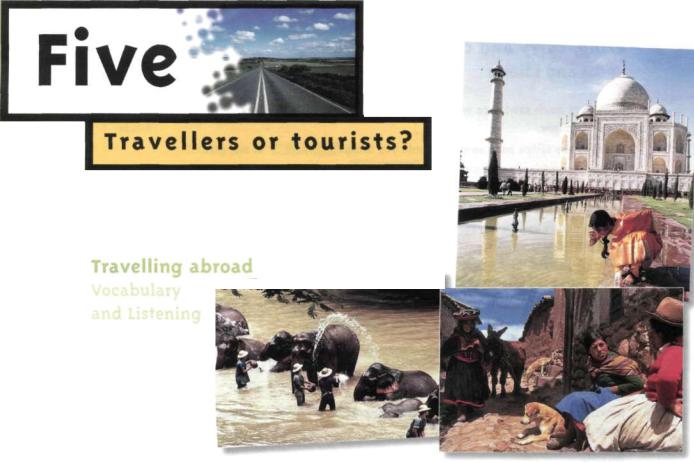
1 Look at the photos and write down ten words that come into your mind when you think about travel and holidays.
2 Find out from your partners:
• which foreign countries they would like to visit
• which parts of their own country they would like to visit one day
• what they enjoy and don't enjoy about travelling
1 Fill each gap in these paragraphs with a suitable word from the list below.
1 |
The first leg of our |
|
|
went smoothly and we arrived at the |
|
|
in good time to |
|||||
|
catch the ferry. Unfortunately, the sea was very rough, so we had a terrible |
|
and we were |
|||||||||
|
all seasick. We spent the first day |
|
in the city and then caught a bus to the seaside |
|||||||||
|
|
where we were going to spend the rest of our |
|
|
|
|
|
|||||
2 |
It's a very |
region where the only people you meet are the locals, who seem quite |
||||||||||
|
|
at first, but when you get to know them they're very |
|
|
. They still wear their |
|||||||
|
traditional |
|
and the old |
|
are still kept alive. Most of the villages are still |
|||||||
|
|
and not at all |
|
. The few travellers who do visit the region are mostly |
||||||||
|
|
who are there to enjoy the magnificent |
|
|
|
|
|
|||||
3 However much I travel I still get nervous when I cross a |
. Why is it that |
|
||||||||||
|
officers have guns and whenever they ask if I've got anything to |
|
, I feel |
? |
||||||||
|
And the |
|
officer (also alarmingly armed) spends ages |
|
|
my |
|
|||||
|
because the photo makes me look just like a |
! |
|
|
|
|
|
|||||
|
|
|
|
|
|
|
|
|
|
|||
|
border |
checking |
commercialised |
controlling |
costumes |
crossing |
customs |
customs |
|
|||
|
declare |
frontier |
guilty |
hikers |
hospitable |
immigration |
isolated |
journey |
passport |
port |
||
|
remote |
reserved |
resort |
scenery |
shy sightseeing smuggler terrorist |
traditions travel |
||||||
|
trip unspoilt vacation |
view |
visa |
|
|
|
|
|
|
|||
|
|
|
|
|
|
|
|
|
|
|
|
|
I
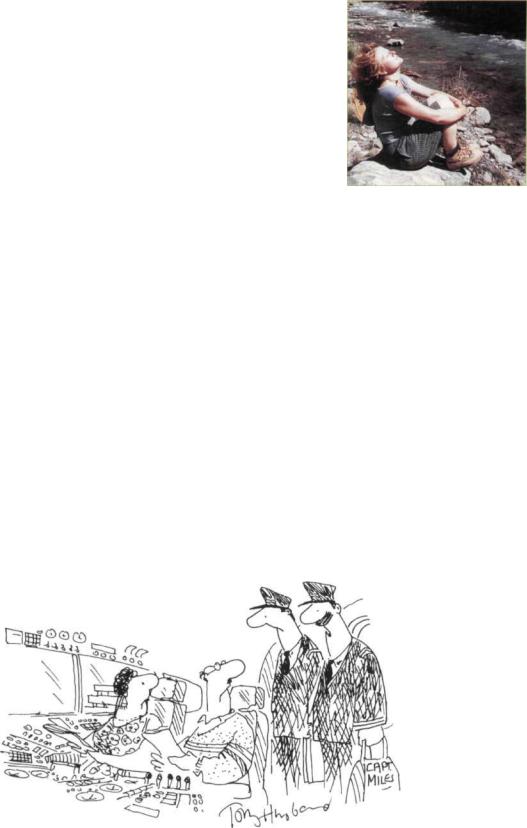
New Cambridge Advanced English
2Look at the words you DIDN'T choose from the list - where could they be used? What other words (not in the list) would fit equally well in the gaps?
You'll hear an interview with Susan Davies, talking about her travels in Australia. Fill each gap in this summary with ONE word only.
For Susan, the advantages of travelling alone are:
- |
She likes the |
|
- |
She likes being able to do |
what she wants |
- |
It's easier to get |
to people |
But when something goes |
it can be a |
||
During her travels in Australia she worked on a |
station |
||
(ranch) in Queensland. |
|
|
|
She got the address from someone in a |
|
bar in Sydney. |
|
When the Greyhound bus driver |
|
her off in the middle |
|
of |
, she felt |
|
|
Susan Davies
After her first evening meal with the family she had to walk across the |
, being careful not |
|
to tread on the |
. She was also warned to shake her |
. She shared her |
with a flying |
. And there was a |
in the toilet. |
Although she appreciates a hot |
and a |
bed, she could still wash in a |
or sleep on a |
if she had to. |
|
Ask your partners these questions:
•How would you have reacted to Susan's experiences in Australia?
•What are some more disadvantages of travelling alone?
•Why do people travel? Why do YOU travel?
•What can you learn from travelling?
•What is the difference between a 'traveller' and a 'tourist'?
'Excuse me, those seats are taken'.'

5.2Tourism and tourists
1Before you read the article, note down what you think might be some of the disadvantages of an all-inclusive holiday, and the problems that mass-market tourism causes.
2Read the article and note down the answers to these questions:
Which island(s) has/have . . .
1 . few tourists?
2. depended mainly on agricultural exports?
3. had a hit song criticising its tourism policy?
4. hardly any resorts owned by local people?
5. mostly all-inclusive hotels?
6. not got an international airport?
7not got the kind of beaches that tourists prefer?
8not needed to import much agricultural produce from the USA?
9plenty of hotels owned by local people?
10prevented local people from getting onto the beaches?
11businesses that the tourists don't visit?
12 tried to make tourism suit the needs of the local people?
Trouble in paradise |
|
|
|
POLLY PATTULLO |
|
|
|
|
It is said that the Prime Minister of Antigua, a man of enormous height and girth, was once banned from Club Antigua, one of the island's all-inclusive hotels, by a zealous security guard, who, not recognising him, refused him entry because he had no pass. The opposition newspaper, not usually a friend of the PM, commented dryly that once the people of Antigua had to have a pass "to be out of doors after the ringing of a church bell at night".
In St Lucia, where eight out of the 12 major hotels are all-inclusive, a calypso entitled Alien, with its chorus line "Like an alien in we own land," caught the public imagination. It began:
All-indusives tax elusives,
And truth is,
They're sucking up we [our] juices,
Buying up every strip of beach,
Every treasured spot they reach.
The calypso's sentiments were endorsed by St Lucians of all classes: by the fishermen whose access to beaches became barred, by entrepreneurs who discovered that all-inclusive tourists didn't patronise their restaurants or shops, and by the local elite who couldn't nip into an all-inclusive for a cocktail. Whatever their popularity with airlines and tour operators, all-indusives somehow appeared less allinclusive, more all-excluding.
While hotel ownership (in all shapes and sizes) in places such as Jamaica and Barbados has significantly passed into local hands, other islands, such as Antigua, have little control over their most crucial industry. As the leader of Antigua's opposition party says: "Most of the progress has come from tourism, but it is not in our hands. We can't lay a foundation on which we benefit." This may be sour grapes in not winning the election, but the facts suggest that he is right. There,

New Cambridge Advanced English
90 per cent of resorts are owned by foreigners and there are few locals in top hotel management.
What Antigua and other Caribbean islands with a mass-market tourism know now, the people of the nearby island of Dominica (no international airport, few white-sand beaches) have yet to find out. For example, the villagers of Vielle Case - an isolated settlement on the rugged north coast, surrounded by banana gardens, rainforest and the Atlantic below - rarely see a tourist. Even the adventurous ones do not penetrate that far along the pot-holed access road. So the people of Vielle Case are not, for the moment, waiters, hair-braiders or taxi-drivers; they do not sell duty-free Colombian emeralds or T-shirts printed with Vielle Case Jammin'; their young men do not sell drugs or go with young white women.
Yet even these farmers and fishermen are gearing themselves up for tourism. At one village council meeting, the ideas poured out as to what the village might offer tourists and how the locals could earn some dollars. For the Dominican government now sees tourism as one way out of a fragile dependency on bananas. Dominica is not alone: every government in the Caribbean has identified tourism as the region's "engine of growth".
So the numbers of tourists have rocketed: from 5.5 million stay-over visitors 20 years ago to 13.7 million now. From Cuba to Guyana, the Caribbean as a whole is more dependent on tourism (and increasingly so) than any other region in the world.
For it is both the Caribbean's fortune - and misfortune - to conjure up the image of paradise in the western imagination. To attract hotel investors, tour operators and airlines, Caribbean governments must provide a breeze-kissed environment swept clean of hurricane damage, unsightliness, poverty and crime. And, above all, its peoples must smile.
So, to a great extent, the region's tourist industry is forced to organise itself on other people's terms. And once the tourist enclaves form, the raw nerve endings of Caribbean societies are exposed. As the secretary-
general of the Caribbean Tourism Organisation, Jean Holder, says: "There appears to be a deep-seated resentment of the industry at every level of society." Holder believes the root of this problem stems from race, colonialism and slavery. Disaffection among hotel staff is sometimes expressed in such terms. A hotel nurse, for example, told me how the staff had to eat their lunch under a tree, "like we were back in massa's
[the slave master's] time".
The gulf between visitor and local becomes even more acute when hotels import supplies, ignoring the society outside the perimeter fence except as a source of labour. Too few farmers, for example, sell their produce to hotels and many tourists eat only American tomatoes and Hawaiian pineapples (two honourable exceptions are Jamaica and Nevis where schemes to link local farmers and hotels have been consciously developed). History is once again partly responsible. Agriculture is export-oriented and always has been.
Examples of an alternative, "new" tourism, in which the industry is integrated with other sectors of the economy and based on local need rather than external demand, were pioneered in the 1970s, first by Michael
Manley, then Prime Minister of Jamaica, and later by Maurice Bishop in Grenada. Their attempts foundered, in part because antagonistic American governments, in the context of cold-war politics, encouraged tourists to stay away.
In a more conservative climate, the emphasis among Caribbean governments has been to develop mainstream tourism, to improve the arrival statistics
(which inevitably has a social and environmental impact) with marketing campaigns and so fuel that
"engine of growth".
Those who still urge an alternative way do so in the hope that the people of Vielle Case - and all those other communities newly drawn into the tourism web - will not one day have to compose their own versions of Alien.
Highlight these words in the text and try to deduce their meanings without using
a dictionary. Then choose a word or phrase from the list below that is closest in meaning.
1 zealous |
pass |
9 |
|
enclaves disaffection |
||
3 |
endorsed entrepreneurs |
elite |
10 gulf |
|
||
5 |
settlement |
rugged |
|
11 foundered |
antagonistic |
|
alienation |
business people |
division |
enclosed grounds |
failed hostile over-keen |
||
permit supported top people village wild
Discuss these questions:
•What surprised you in the article?
•Does the idea of an all-inclusive holiday (still) appeal to you? Why/Why not?
•How can travel broaden the mind?

(5.3) Making notes
Effective writing
1Look at these three different people's notes. Each example contains ONE extra idea, which isn't in the other two. What is the extra idea in each one?
2What are the merits of each method? Which do you prefer?
3Add TWO more points to the notes you prefer above.
Use one of the methods above to make your own notes on ONE of these topics: Is an active holiday preferable to a relaxing one?
Is it best to get to know your own country before you travel to more exotic places? Which is better: a package holiday or a holiday you organise and book yourself?
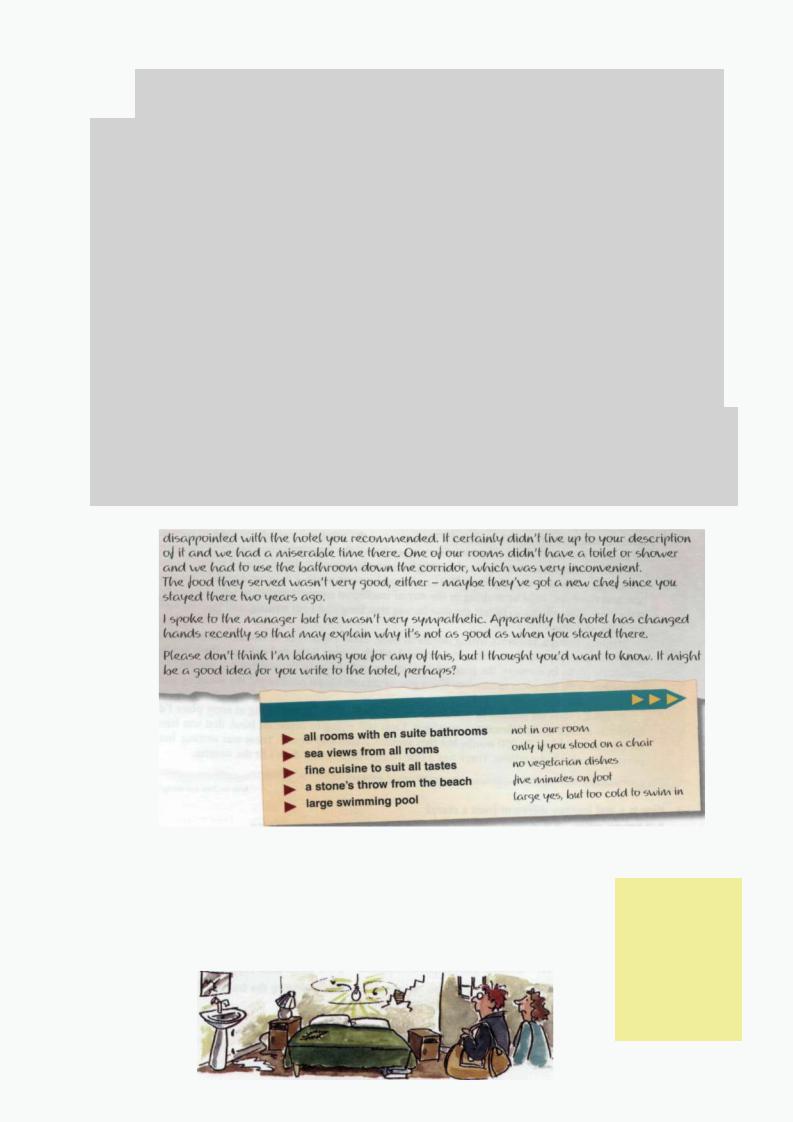
New Cambridge Advanced English
A letter of complaint
Creative writing
1 Read this letter to a travel agent. Decide how it can be improved.
We've just returned from our visit to London, which you arranged for us. There were a number of problems that arose. Firstly, the tickets you sent us had been completed incorrectly and as a result we missed our flight and had to travel on a later plane, not arriving in London till midnight. When we arrived at the hotel you had booked for us, the rooms were no longer available, even though we'd paid you for the accommodation in advance. Fortunately, the hotel staff kindly found us a double room with shower in another hotel and paid for our taxi there. Unfortunately, although the other hotel (the Homeleigh Hotel in Hounslow) was surprisingly comfortable and friendly, it was way out in the suburbs and it took us an hour to get into the centre the next day, which involved a long train journey. Please send us a refund of the money we paid for the accommodation and also compensation for the inconvenience caused by your errors. Looking forward to hearing from you,
Yours sincerely,
2 Delete the irrelevant information in the letter and then divide it into paragraphs.
You recommended the Hotel Fiasco to your friend and her family. Read the extract from a letter from your friend, and the brochure she's sent you with the notes she's made. Write a short ote in reply to your friend (about 50 words) and a letter to the hotel (about 200 words).
1Plan your letter to the hotel. What important points must be included? What are you hoping to achieve by writing this letter?
2Write the letter and the note to your friend.
3show your completed letter and note to another student and ask for feedback: does your partner feel you've achieved your aims?
Including irrelevant information isn't just a waste of time, it detracts from the overall effect of your writing. Omitting important information may mean that your ideas aren't taken seriously.
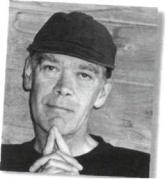
Travel writers
Find out from your partners if they:
use a guidebook when visiting an unknown place. Why/Why not? enjoy reading books about other people's travels. Why/Why not?
Read this passage and then answer the multiple-choice questions below. Use a pencil to underline the phrases in the passage where you found the answers.
Jonathan Raban
Yet actual journeys aren't like stories at all. At the time, they seem to be mere strings of haps and mishaps, without point or pattern. You get stuck. You meet someone you like. You get lost. You get lonely. You get interested in architecture. You get diarrhoea. You get invited to a party. You get frightened. A stretch of country takes you by surprise. You get homesick. You are, by rapid turns, engrossed, bored, alert, dull, happy, miserable, well and ill. Every day tends to seem out of connection with every other day, until living from moment to moment turns into a habit and travelling itself into a form of ordinary life. You can't remember when it wasn't like this. There is a great deal of liberating pleasure to be had from being abroad in the world, continuously on the move, like a lost balloon, but a journey, at least as long as it is actually taking place, is the exact opposite of a story. It is a shapeless, unsifted, endlessly shifting accumulation of experience.
For travelling is inherently a plotless, disordered, chaotic affair, where writing insists on connection, order, plot, signification. It may take a year or more to see that there was any point to the thing at all, and more years still to make it yield an articulate story. Memory, not the notebook, holds the key. I try to keep a notebook when I'm on the move (largely because writing in it makes one feel that one's at work, despite all appearances to the contrary) but hardly ever find anything in the notebook that's worth using later. Trifles are described at inordinate length. Events that now seem important aren't mentioned at all. The keeper of the notebook sounds stupid and confused. He grouses too much about tides and timetables, and all the forgettable mechanics of the journey; he fails to notice what I remember observing in near-photographic detail. When I'm writing the book, I get precious little help from him . . . the odd proper name, a date, an ascertainable fact here and there, but little or nothing in the way of intelligent comprehension of what he was doing at the time. Why was he so blind? Because he was travelling and I am writing, and the two activities are chalk and cheese.
Memory, though, is always telling stories to itself, filing experience in narrative form. It feeds irrelevancies to the shredder, enlarges on crucial details, makes links and patterns, finds symbols, constructs plots. In memory, the journey takes shape and grows; in the notebook it merely languishes, with the notes themselves like a pile of cigarette butts confronted the morning after a party.
In 1982,I took six months to sail slowly round the British Isles, stopping at every place I'd known as a child and adolescent. A year later, I was still trying to begin the book that was based on the journey. I had 30,000 words, but they seemed forced and wrong. There was writing, but as yet no story worth the telling. There was a title Foreign Land, but it didn't fit the writing.
|
|
|
from For Love and Money by Jonathan Raban |
1 How is a real journey different from a story? |
|||
A It has no order В It is more frightening С It is an interesting experience |
|||
2 Why doesn't Jonathan Raban write his books straight after his return from a journey? |
|||
A He needs to read his notebook |
В He never forgets the details С His memory needs time |
||
3 How does he look upon the person who wrote the notebook? |
|||
A As a younger version of himself |
В As an old friend С As a stranger |
||
4 Why does he always make notes during a journey? |
|||
A To help him remember |
В То make him feel he's working С То fill the spare moments |
||
5 Why is memory more productive than the notes he made? |
|||
A Memory creates order |
в Notes omit important details С His notes aren't legible |
||
6 What useful information can he get from his notebook when he's writing the book? |
|||
A None at all В A few names and dates |
С The route he took |
||
7 How did the writer travel round Britain? |
|
||
A On foot В By car С In a sailing boat |
D By public transport |
||

New Cambridge Advanced English
Highlight these words in the text and try to deduce their meanings without using a dictionary (the line number is given beside each word). Then choose the word on the right that is closest in meaning.
haps |
1 |
|
misfortunes |
pleasant happenings |
disasters |
||
accumulation |
10 |
|
collection |
lack |
selection |
|
|
inherently |
11 |
|
by the way |
by no means by nature |
|||
articulate |
13 |
|
long |
amusing clear |
|
||
trifles |
16 |
|
meetings |
unimportant things exciting events |
|||
inordinate |
16 |
|
fascinating |
excessive insufficient |
|
||
grouses |
18 |
|
writes |
celebrates |
grumbles |
|
|
languishes |
27 |
|
loses vitality becomes interesting |
improves |
|||
Ask your these questions:
•How do your own experiences of travelling compare with Jonathan Raban's?
•Have you ever written a diary or used a notebook during a holiday?
•Do you take photos during a holiday? Why/Why not?
•Which travel book would you recommend to someone who is going to visit your own region for the first time?
High, middle and low
Idioms and collocations
Replace the words in red with expressions from the list below and make any other necessary changes.
1 I have searched everywhere for my keys.
2Delays at the airport may be terrible in the main holiday period.
3This CD contains the best parts of the show, not the whole thing.
4Operas and chamber music are often considered to be intellectually superior, while shows like musicals are sometimes described as uncultured - or at least not so very artistic.
5Good quality audio equipment is on sale in every main shopping street.
6If you come across useful new words in a text, use a yellow pen to make them stand out.
7Would you like to live in a tall multi-storey building - or do you think two to three storey buildings are more pleasant for people to live in?
8Passengers and vehicles will be carried on ultra-modern shuttle trains.
9Everyone was feeling elated before the weekend.
10There's less room for holidaymakers on the beach when the sea comes up high than when it goes out.
11I've got a bad cold and my work is getting me down - that's why I'm depressed.
12Do you think a person is no longer young when they're 40, 50 or older?
13In Britain, it's not only professional and business people who own their own homes.
14Students who do well in their exams at secondary school can go on to university or college.
15Don't put off doing this work any longer - you should do it now.
at high tide |
hi-fi high and low high season high-tech high-rise highbrow higher education |
|
highlight highlights in high spirits |
it's high time high school high street |
|
middle-class |
middle-aged middlebrow |
|
at low tide |
feeling low lowbrow |
low-rise |
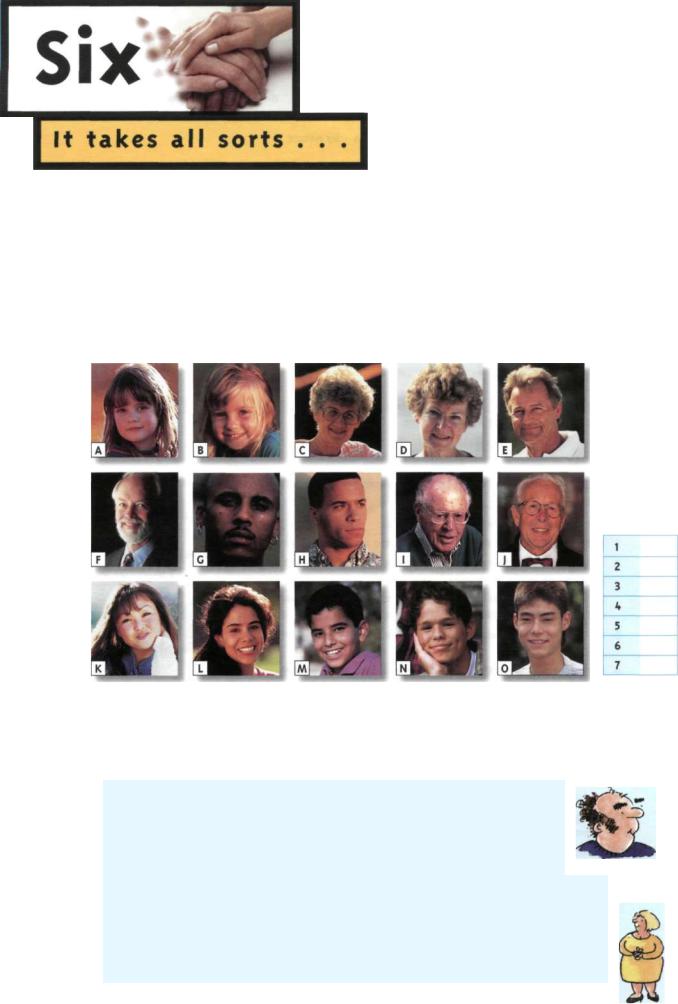
What do they look like?
Listening and Vocabulary
You'll hear seven of these people being described. Match the descriptions you hear to the photos below.
1 Look at these ideas for describing a person's appearance and some expressions you might use if someone asked you:
What's special or remarkable about him or her? OR How would someone else recognise him or her?
Age
He or she is . ..
thirty-something in her mid-twenties middle-aged in his teens over sixty in her early/late thirties fortyish
Face, hair, eyes and complexion
He or she has . . .
an open face curly/wavy/straight hair a pale/dark complexion bushy eyebrows a good tan wrinkles a double chin laughter lines
Height and build or figure
He or she is quite/very/fairly/rather.. . athletic/well-built slim/skinny plump/chubby

New Cambridge Advanced English
Clothes and footwear
He or she usually wears .. .
casual/smart/conventional clothes a formal suit a sports jacket running shoes a sweater/jumper/pullover/cardigan
Family
He or she . . .
is an only child is the eldest child is single is a single parent has two kids
Job and interests
He or she .. .
is a lawyer/solicitor/attorney works in the city used to be an engineer
He or she .. .
enjoys sailing spends a lot of time reading is quite sporty has a pilot's licence once spent a year in the States
2Add two more words or phrases to each set of examples above. Use a dictionary if necessary.
3Compare the words or phrases you've added.
Work in pairs Now take it in turns to describe the people on the previous page that the speakers didn't describe. Don't tell your partner who you're going to describe, but when you've finished, ask your partner to comment on the accuracy of your descriptions.
1Take a good look at each other and then take it in turns to describe one of the members
of the group — but do this WITH YOUR EYES CLOSED, so that you have to do it from memory.
Even if you can quickly guess who is being described, allow each speaker to continue. And, with their eyes still closed, ask them questions to test their memories and descriptive skills.
2When everyone in the group has been described, describe some of the members of the other groups too.
One of you should look at Activity 3, the other at . Describe the people in the photo to your partner.
Politically correct?
Reading
1 What do you think follows in the rest of this story? What do you think the boy's parents said and what do you think his teachers said?
A kiss is not just a kiss if you are six
By David Sapsfed in New York
A BOY of six has been punished by his school in America for sexual harassment after giving a girl classmate a kiss on the cheek.
